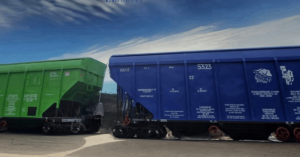
“TAS Dneprovagonmash (DVM, Kamianske, Dnipro region) will supply more than 400 freight cars (gondola cars and platform cars) to Ukrzaliznytsia and Lithuanian Railways by the end of the first half of 2025 following the results of the tenders won in November-2024, the company reports on its Facebook page.
“The company started the winter production season by signing two major contracts with Ukrzaliznytsia and Lithuanian Railways,” the company said in a statement.
DVM clarifies that gondola cars of the 12-4106 model will be manufactured for Lithuanian partners, and a new development of the plant – 40-foot platform cars for large-tonnage containers of the 13-4155 model – will be delivered to UZ.
As reported, the Lithuanian rail freight operator LTG Cargo (part of Lithuanian Railways) will purchase 200 gondola cars for bulk cargo transportation from DVM for EUR 12.7 million. The first gondola cars are expected to be delivered in February-April 2025.
For its part, according to Prozorro, on December 3, TAS Dniprovagonmash and Ukrzaliznytsia signed a contract for the supply of 252 units of 40-foot fitting platform cars by June 30, 2025, for UAH 707.011 million (including VAT).
The contract provides for a 50% advance payment within 20 calendar days from the date of invoice.
In addition to TAS Dneprovagonmash, the Research and Mechanical Plant Karpaty participated in the tender for the supply of platform cars to UZ, with a bid of UAH 589.680 million against UAH 589.176 million from DVM, for an expected purchase price of UAH 608.58 million (all excluding VAT).
According to the State Railways Administration, the new platform cars have a tare weight of 20.5 tons and a carrying capacity of 73.5 tons, which “will guarantee the transportation of maximum cargo volumes compared to analogous cars available on the market.”
In addition, the platforms will be able to run on the EU rail network.
“TAS Dneprovagonmash is controlled by the TAS financial and industrial group of businessman Serhiy Tigipko. The plant, which has the capacity to produce 9,000 railcars a year, produced 378 freight cars in 2023, down 34.5% from 2022.
In January-September, the company posted a consolidated net profit of UAH 84.08 million, up 6% compared to the same period in 2023, while consolidated net income increased by 62.8% to UAH 1.61 billion.
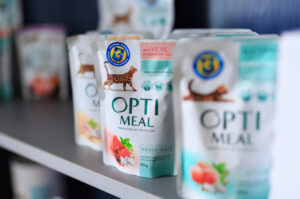
The European Bank for Reconstruction and Development (EBRD) is providing Kormotech, a leading Ukrainian pet food producer, with a financing package to increase exports and geographic diversification by building a second pet food plant in Lithuania, the EBRD press service reports.
According to the release, the total cost of the Kormotech project will be EUR63 million.
The allocated financing package is a EUR40 million A/B syndicated loan, of which EUR20 million will be provided by the Dutch SDG-focused asset management fund ILX Fund.
The bank has previously provided EUR 15 million to Kormotech Group, a long-standing EBRD client, for the construction of its first plant in Lithuania, which began operations in June 2020. The bank also provided a EUR3.3 million loan to the company to replenish working capital during the Covid-19 pandemic in 2020.
The EBRD loan is accompanied by grant financing, including a grant from the Japan-EBRD Cooperation Fund, which partially covers the costs of external lawyers. The grant funding will also partially cover the cost of new workplace equipment that will create new livelihoods for groups that need more attention, including women and people with disabilities. This component is being implemented as part of the EBRD’s new program aimed at stimulating capital investment.
The loan is provided to the Group’s holding company Vengast Investments Ltd (Cyprus) and its subsidiary in Lithuania, Kormotech UAB.
The EBRD is the largest international financial investor in Ukraine. Since the beginning of the war in 2022, the bank has provided EUR 5 billion to the Ukrainian economy and agreed with shareholders to increase capital by EUR 4 billion, which will allow it to continue lending at current levels during the war and further increase volumes during the full-scale recovery phase.
Kormotech is a global family-owned company with Ukrainian roots that has been producing cat and dog food under the Optimeal, Club 4 Paws, Woof! and Meow! brands since 2003. The company has production facilities in Ukraine and the EU, with a product range of over 650 items. Its focus on exports and geographic diversification helps it withstand the impact of Russia’s war against Ukraine.
The new project will also help Kormotech strengthen its human resources and skills development efforts in light of the current challenging situation on the Ukrainian labor market, including creating new employment and training opportunities for women, veterans, and other groups that require more attention. It will also enable Kormotech to improve energy efficiency.
In 2023, Kormotech’s turnover increased by 22.5% to $152 million from $124 million in 2022. The ratio of sales abroad and in Ukraine in tons is now 31% to 69%, respectively (in 2022 it was 28% to 72% in Ukraine).
Kormotech brands grew most dynamically in the markets of Romania (+35%), Poland (+11%) and Moldova (+11%).
Kormotech is a leader in Ukraine, one of the world’s top 50 pet food producers and one of the top 21 most dynamic pet food brands. The ultimate beneficiaries of Kormotech are Olena and Rostyslav Vovk.

The Lithuanian government has extended the temporary residence permit in Lithuania for Ukrainian residents who fled the war, LRT reports.
“Previously, this protection was established until March 2025. The government has extended the temporary protection until March 4, 2026. This means that it will be possible to issue temporary residence permits that will be valid until that date,” the report said.
According to the Department of Migration, 30-40 new applications for a temporary residence permit in Lithuania are registered daily. Currently, more than 44.3 thousand people have a valid residence permit in Lithuania on the basis of temporary protection.
According to the Minister of the Interior, Agne Bilotaite, the extension of the deadline will allow Ukrainians to reduce the administrative burden, as they will have a residence permit valid for a longer period of time.
The extension of this period was proposed on the basis of the relevant decision of the European Union (EU) adopted in June this year.
The temporary protection mechanism at the EU level was activated on March 4, 2022, shortly after Russian troops invaded Ukraine.
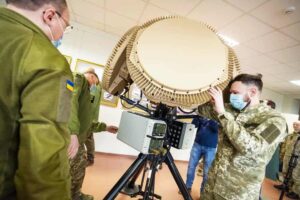
Lithuania is allocating EUR35 million to Ukraine for the purchase of radar and demining equipment, and plans to supply more than 5,000 Lithuanian-made drones by the end of the fall, Prime Minister Ingrida Šimonite said.
“At our meeting today, I informed President Zelensky that the recent package of military assistance from Lithuania to Ukraine will arrive in early September. It will include 10 short-range air defense systems, 30 anti-submarine missiles and other equipment, weapons and ammunition. In addition, we are allocating 35 million euros for the purchase of radar and demining equipment,” Šimonite said at a press conference on Saturday.
“By the end of the fall, we hope to be able to provide more than 5,000 Lithuanian-made drones,” she added.
According to Šimonite, the Lithuanian government has pledged to spend at least a quarter of its GDP on defense and security assistance to Ukraine each year.
“My government will not only ensure but also exceed this plan. I hope that no matter what kind of government we have after the elections in October, it will remain committed to this goal,” she emphasized.
The Prime Minister added that a new package of equipment to help restore Ukraine’s energy sector is also coming. In addition, Lithuania will continue to support Ukraine’s recovery with a focus on the education and healthcare sectors.
“Today, another kindergarten in Borodyanka, which Lithuania helped to restore, has opened and is ready to welcome Ukrainian children. In response to President Zelenskyy’s request, we will also help three hospitals in Zhytomyr, Dnipro and Lviv regions,” Šimonite said.
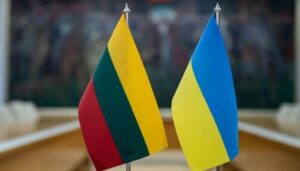
The Pranas Gudinas Center for Restoration of Museum Valuables of the Lithuanian National Museum of Art will help restore 100 paintings by Maria Primachenko, the Ukrainian Ministry of Culture and Information Policy said.
“The center is the main training base for restorers of movable art treasures in Lithuania, particularly paintings and tapestries. Master classes, seminars and lectures related to the preservation and care of museum collections are held here,” the press service of the Ministry of Culture said in a statement following a visit to the Center by acting Minister of Culture and Information Policy Rostislav Karandeev.
The Center’s restorers have already examined and restored more than 50 paintings and 1,000 graphic works from Ukrainian museums, and another 600 works and at least two Ukrainian interns are expected in the near future.
“In addition, in the near future in this center will be restored 100 paintings by Maria Primachenko from the state part of the Museum Fund of Ukraine from the funds of the communal institution ‘Zaporizhzhya Regional Art Museum’ of the Zaporizhzhya Regional Council”, – stated in the message.
As of today, paintings from the Ukrainian Khanenko Museum are being restored, and Lithuanians are also restoring a Ukrainian carpet from Mariupol.
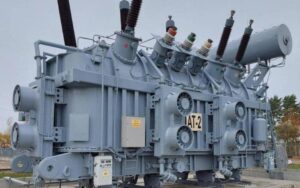
The Lithuanian Ministry of Energy intends to ban the use of Chinese software during the construction of solar and wind power plants with a capacity of more than 100 kW, said the head of the department, Dainius Kreivis.
According to him, no such restrictions are planned for low-capacity power plants installed by residents of the country.
“We are preparing documents so that all equipment, even in private investments, that generates more than 100 kW, cannot use any Chinese software,” Kravis told Ziniu radijas radio station on Thursday, answering the question whether Lithuania should abandon Chinese technology in the country’s power system.
“That is what we plan to do. I think the decisions we will make will solve the problem,” the minister said.
The Energy Minister emphasized that government agencies are already prohibited from installing Chinese-made software.
According to Kravis, despite the growing number of household electricity producers, there is currently no threat of “excessive use” of Chinese equipment at their facilities.
President of the Lithuanian Confederation of Industrialists Vidmantas Janulevicius said at a meeting of the Seimas Committee on Economics in late March that Chinese software is often used in the construction of renewable energy facilities both in Lithuania and in the rest of Europe. He suggested looking for funds to replace Chinese technology at existing power plants with Western software.